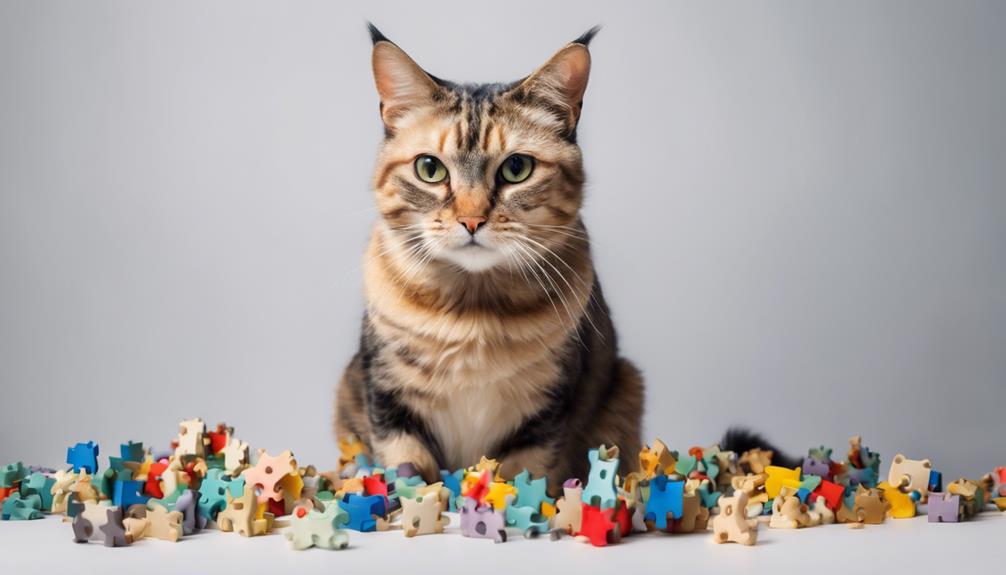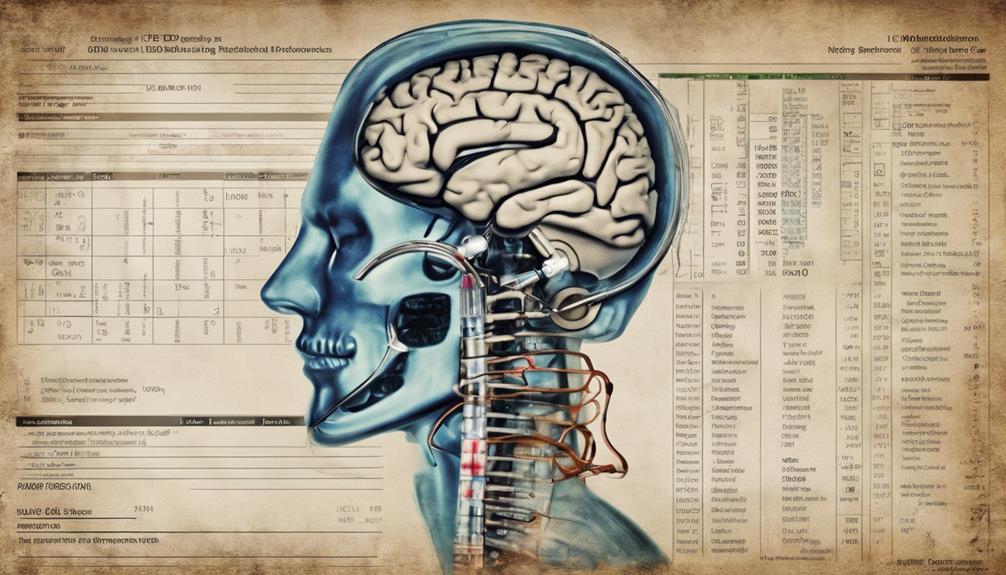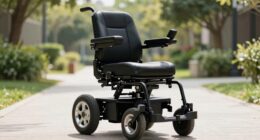As pet owners, we frequently observe the playful behaviors and soothing purrs of our cat companions, but what occurs when those well-known actions begin to change?
Imagine the uncertainty creeping in as you notice subtle changes in your cat's daily routines. Could it be a sign of something more?
Let's explore the nuances of feline cognitive health and how a simple quiz might hold the key to unraveling the mysteries behind your cat's behavior changes.
Understanding Feline Cognitive Decline
Feline cognitive decline, commonly referred to as cat dementia, is a prevalent condition observed in older cats typically between the ages of 10 to 15 years. This cognitive dysfunction, similar to dementia in humans, presents a range of symptoms that can impact the quality of life for senior cats. Signs of dementia in cats may include disorientation, changes in sleep patterns, decreased appetite, and increased vocalization. Recognizing these symptoms is crucial for early intervention and management of feline dementia.
Understanding the nuances of feline cognitive decline is essential for pet owners to provide the best care for their aging feline companions. When observing potential signs of dementia in older cats, it's important to seek veterinary evaluation to rule out other medical conditions with similar symptoms. By staying vigilant and proactive in monitoring the cognitive health of senior cats, caregivers can implement strategies to improve their quality of life through routine, nutrition, mental stimulation, and environmental adjustments.
Recognizing Early Signs of Dementia

Recognizing the early signs of dementia in cats involves closely monitoring changes in their behavior and daily routines. When it comes to cognitive decline in felines, certain signs may indicate the onset of dementia.
Senior cats experiencing dementia may display alterations in their sleeping patterns, such as increased restlessness or confusion. Additionally, excessive licking or a lack of self-grooming could be manifestations of cognitive dysfunction in older cats.
Soiling and urinating outside the litter box are also potential indicators of dementia in cats. Behavioral changes like disorientation, restlessness, and anxiety shouldn't be overlooked, as they could be early signs of feline dementia.
Taking the Dementia Quiz for Cats
Engage in the dementia quiz for cats to assess behavior changes in senior felines over the past six months. This quiz serves as a valuable tool in identifying potential signs of cat dementia and distinguishing them from normal aging behaviors in older cats. By observing your cat's actions and responses, you can gain insights into their cognitive health and well-being.
Here are some key points to consider when taking the dementia quiz for cats:
- Look for symptoms like pooping or peeing outside the litter box and excessive grooming, which could indicate cognitive decline in senior cats.
- Observe signs of disorientation, excessive vocalization, and changes in appetite or weight, as these may point towards early detection of cat dementia.
- Taking the dementia quiz can lead to appropriate veterinary care and the implementation of management strategies tailored to support cats with dementia, ensuring their comfort and quality of life.
Interpreting Quiz Results for Cats

Upon completion of the dementia quiz for cats, analyzing the results is crucial in determining potential signs of cognitive decline and guiding appropriate actions for your senior feline's well-being.
The quiz results may reveal behavior changes such as disorientation, excessive vocalization, or alterations in grooming habits, which could indicate cat dementia.
It's imperative to seek a veterinarian evaluation to obtain a comprehensive assessment and accurate diagnosis based on the quiz outcomes. Understanding the quiz results can help identify red flags that suggest the necessity for further investigation into your cat's cognitive health.
Proper interpretation of the quiz results is essential as it can lead to early detection of dementia in cats, allowing for timely interventions and support. With this information, tailored management strategies can be implemented to enhance your cat's quality of life and address any cognitive issues effectively.
Next Steps for Cat Dementia Care
Monitoring your cat's behavior closely for signs of disorientation, restlessness, or anxiety is crucial in identifying potential dementia symptoms. If you suspect your cat may be experiencing dementia, consider taking the following steps:
- Consult with a vet: It's essential to rule out other medical conditions that may mimic dementia symptoms in cats. A veterinarian can provide a proper diagnosis and recommend appropriate treatment options.
- Implement environmental adjustments: Create a cat-friendly environment by offering multiple food and water stations, comfortable resting areas, and easy access to the litter box. These adjustments can help reduce stress and confusion in cats with dementia.
- Incorporate cognitive-supporting nutrients: Consider adding supplements rich in cognitive-supporting nutrients to your cat's diet. These supplements may help improve cognitive function and overall brain health in cats experiencing dementia.
Regular veterinary check-ups and ongoing discussions about management strategies are crucial for maintaining your cat's quality of life as you navigate the challenges of feline dementia.
Frequently Asked Questions
What Are the First Signs of Dementia in Cats?
We notice the first signs of dementia in cats by observing changes in their behavior, such as:
- Altered sleeping patterns
- Confusion
- Restlessness
- Disorientation
- Anxiety
- Excessive licking
- Lack of self-grooming
Additionally, soiling or urinating outside the litter tray often indicates early stages of dementia in felines.
Recognizing these initial signs promptly is essential for timely intervention and effective management of cat dementia.
How Do You Test a Cat for Dementia?
When assessing a cat for dementia, the process usually involves a thorough veterinary evaluation to eliminate other potential health issues. This can include various diagnostic tests like blood work, urinalysis, and imaging studies.
By carefully observing behavioral changes, disorientation, and altered sleep patterns over time, we can better identify signs that may indicate dementia in our feline companions.
It's crucial to approach the evaluation with patience and diligence to ensure the best care for our pets.
How Do You Comfort a Dementia Cat?
To comfort a dementia cat, we focus on creating a safe and consistent environment. We offer gentle physical contact for reassurance and use pheromone diffusers for a soothing atmosphere.
Ensuring easy access to resources like food, water, and resting areas supports their daily needs. By maintaining a routine and providing comfort through petting and cuddling, we help our dementia cat feel secure and reduce stress and confusion.
How Do I Know if My Cat Is Going to Be Senile?
We observe feline behavior changes like disorientation, restlessness, or anxiety for signs of senility. Excessive licking or lack of grooming may signal cognitive decline. Soiling outside the litter box could indicate senility, as can shifts in sleep patterns.
Vet consultation is vital to rule out other medical issues and confirm cognitive changes. By being vigilant and seeking professional advice, we can better understand and address possible senility in our beloved cats.
Conclusion
In conclusion, by understanding feline cognitive decline, recognizing early signs of dementia, and taking the dementia quiz for cats, pet owners can proactively address their cat's potential medical conditions.
Interpreting quiz results and taking the next steps for cat dementia care are crucial for ensuring the well-being and quality of life for our beloved feline companions.
Stay informed, observant, and proactive in caring for your aging cat's cognitive health.









